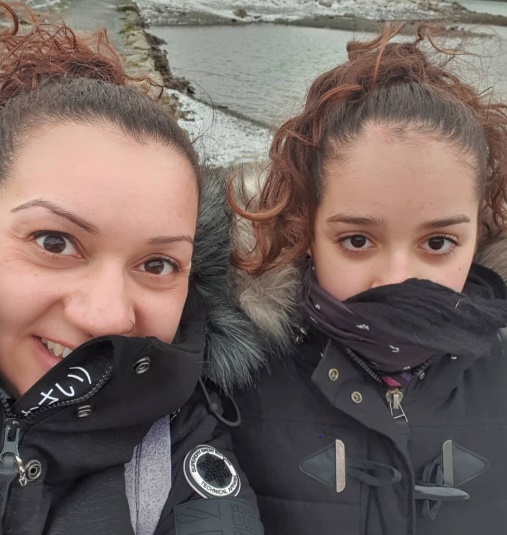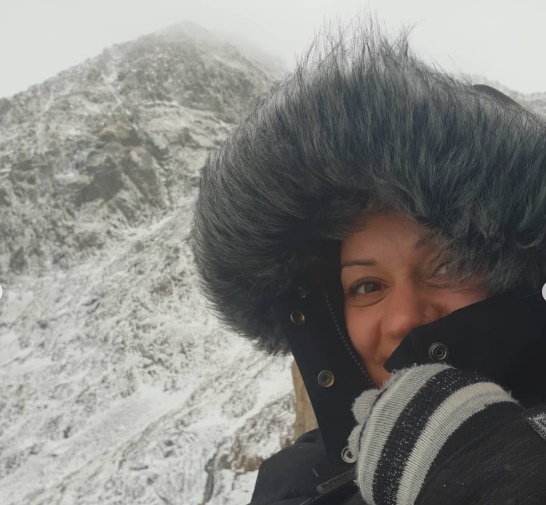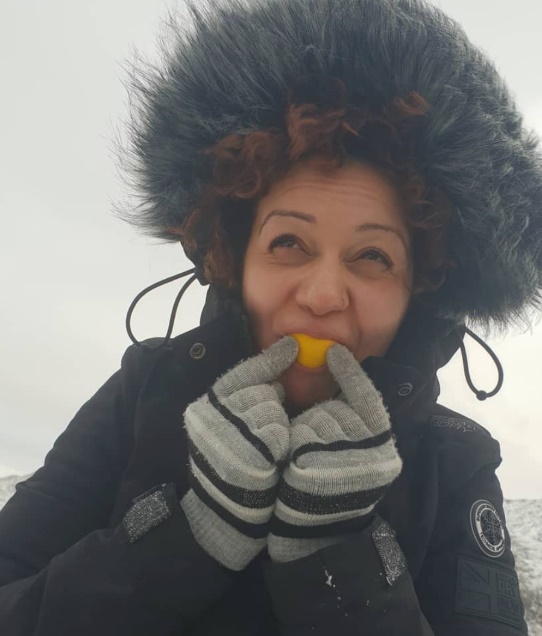Your Research. Your Life. Your Story.
A magnetic community of researchers bound by their stories
Every researcher has a story. What’s yours?
Academic lemons versus mental resilience

Hi, pleased to meet you!
Sometimes I think it’s so obvious that combining PhD life with personal life means that we sometimes honestly don't even know who we are anymore.
I am often defined as a mature student, a (now single) mum of 4 children, a pet owner, a sufferer of Inflammatory Bowel Disease and mental illness, a motivator (not sure where that comes in, but it’s been said a few times), and/or a second year PhD student. Despite this, I personally cannot exactly tell you who I am, just yet. However, to date, the best title I’ve ever been given so far was ‘graphene-ninja,’ coined by the lovely Fiona Tatton, founder of a digital magazine Womanthology, which is aimed at empowering positive female role models by providing a platform for them to network through their work and ideas. Nonetheless, if you just give me a bit more time to find myself, then I’ll let you know, who I am. But for now, I'd like to go by #Nuttegg.
Academic advice is not really realistic or translatable!
I could bore you with my journey thus far, but I won't. I think it's more important to reach out to all those students who are struggling mentally, academically, or in any other way. And let me tell you, regardless of your struggles, you are all at this stage of academia because you were one of the chosen few who COULD make it this far as compared to your peers. This means something – hold on to it! This is easier said than done though, because the road to becoming an academic or researcher can be, in my view, like taking a long walk, where the path is covered with Lego bricks, and you don't have any shoes on. Sometimes, I feel it’s more like flying (or winging it with confidence and style).
I've seen so many peers break under the pressure of research life. One of my biggest pet peeves is the barrage of academic do-gooders who advise students to pick supervisors who are “kind,” or who have “a good record.”
Yes, we must all try to research the group we are hoping to work with. We should ask the questions. But, can the larger academic community (especially on social platforms, whom I call “Social Academia”) please tell us, who we should ask these questions to? Imagine being a new student at a university - you are proactive, you meet the supervisor, you ask about the work, how it will follow on, etc. Then you ask the supposedly necessary questions: “So, are you kind?” “Do you help your students when they are stuck?” “How quickly do you respond to emails?” and so on.
This can go one of two ways. If you are lucky enough to be in a particular institution already, you can ask around. But what if you are not? What if you meet the supervisor and they seem to be the friendliest, kindest person in the world? Yet, when you start working with them, they turn out to be passive-aggressive, cherry-pick the emails they choose to respond to, take meetings off on a tangent, or throw your questions back at you? If “Social Academia” is going to give advice, I feel that it should be more rounded. For instance, how about telling students how to overcome these obstacles, instead of telling them what they should have done after the fact! How about giving strategies! Not everyone is strong-minded. Many students are afraid of their level of knowledge, because there is often no benchmark for us to measure ourselves against.
There are also, students who struggle with mentors who don’t support them emotionally, but academically. Or, in my view, the worse type of mentor is one who emotionally supports you but does not help you academically. Some students are faced with an unfair delegation of undergraduate students, who they have no training to support, and often are not paid to do so. Some students are expected to help with teaching and marking responsibilities, or not given the options to claim back costs for conferences or travel to academic events. These things can make achieving your own deadlines much more tedious and impose additional financial burdens on top of the loss of time.
Academia is like the dead man’s zone in a war. And everyone will tell you that you need to have time for family, friends, and yourself. They will tell you to prioritize work (often in their favor), but they don’t show you how to do this. They do not always give consideration to you, your family, or much else. But for some of us, even though people are trying to help, those words just remind us of how isolated we really are. Not everyone has friends or family they can reach out too; some of us have children and can't take time away - even for just a few hours, even if that time is needed just to think peacefully.
I know my own struggles as a researcher, mother, or friend. I know that I’ve not always been able to make time for others or for myself when it has been most needed. I also know, that because of the way my peers view me, i.e., as strong, and knowledgeable, I don’t feel like I can, or even should ask for help. I know the frustrations I have had to overcome when I instead needed to deal with seemingly impossible or overlapping deadlines and chores, or the battle of not having a benchmark that dictates what I “should know” versus “what I am learning.” I know how it is to go through the day when it looks like you have to scale a mountain, swim across a river channel, AND do a 1000-m sprint – all in one day!
In the last 9 months, the anxieties and lows have left me feeling like brushing my teeth was a chore, and I even felt as though there was no point in going on anymore. Self-care was almost unachievable. I looked at my children, and I thought - “What the hell are you doing Claire? This isn’t you! You are someone who does big things and makes them seem mundane, even when you are struggling. You are the person who challenges that negative energy to turn itself into good.” And so, that’s precisely what I did. I climbed a mountain. And when I got to the top I literally sucked a lemon. I do realize that this won’t change my problems or make my work easier. But it surely does remind me who I was. And of who I am! And this energized me. And that was when I decided that it’s up to me to keep this momentum going.

Here's a picture of the mountain I climbed

Here I am at the start of the climb

And, here I am half way there

And here’s when I finally made it to the top! What an experience!
See, I told you that I literally sucked a lemon!
So, the next time any of you know of someone who seems to be struggling, just be around them. Say “hi” as you pass them in the corridor, smile at them, or offer them a cup of coffee if you’re making one. Hell, even tell them about your day and any issues you have had. Before long, they will feel like they can open up to you, and you can help them. Offering support is not always about asking if someone is doing fine. It's also about being in the presence of a person, and just being friendly while also being supportive.
On another note, I think some of the mental health issues seen in academia would reduce considerably if it were compulsory for higher-level academics to have some form of mentorship or counselling training. In my view, higher education encroaches on your personal life so much, that it is not just about the academic achievements anymore - it’s about your whole life!
I would love to know other people's views on this, though. Do you think it would help if mentors were more understanding? Or do students just need to learn more quickly to get a hold on their own balance?
I’d now like to share a quick bit about my research area: I work with stem cells, and different types of Graphene. I am particularly interested in how graphene derivatives interact with cells but that's more of a side interest. I do a lot of cytotoxicity work (looking at cell viability), invasion and migration of cells in various scaffolds, and I study the mechanisms of how stem cells change into other cells, like bone cells, for instance. Despite the heavy costs on my mental health, I do enjoy academia. But it’s been a long journey until I was able to find my balance. And if you traverse your journey, eventually, you will too. In the process, I would suggest that you try to always remain flexible, and open-minded. Note and celebrate your little wins; those are the ones that add to huge achievements at the end. But don’t forget that the failures add to your growth, and they enrich your depth of knowledge too.
Thanks for reading and do try to keep your well-being a priority. Deadlines, projects, and all those things are countless. They will mount up and eventually need to be dealt with. But there is really ever, only ONE you. And if you aren’t there, your deadlines will mount anyway. I know because I have struggled with this too. And, I know a few children who almost didn’t have a mummy this year.
So please try your best to just show up. Take the rest of the day as it comes. If you get a burst of energy, don’t let it slip to the side, try to channel it and help it gain momentum.
Love yourself, and have faith in your own abilities.
Comments
You're looking to give wings to your academic career and publication journey. We like that!
Why don't we give you complete access! Create a free account and get unlimited access to all resources & a vibrant researcher community.

Your Research. Your Life. Your Story.
A magnetic community of researchers bound by their stories






